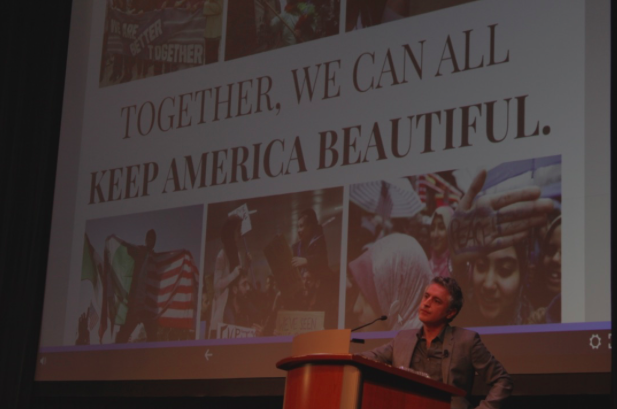As part of the Wisconsin Union Directorate’s ongoing Distinguished Lecture Series, internationally renowned writer Reza Aslan spoke to a crowd of students Wednesday about Islamophobia in America.
Aslan opened up his presentation at the Memorial Union’s Wisconsin Union Theater with a declaration: “I’m an immigrant.”
Having immigrated from Iran to the U.S. with his mother in 1979, Aslan joked about spending years of his childhood pretending to be Mexican. He did this, however, because of his desire to distance himself from the discrimination against Iranian and Muslim people.
Turning to address the association between Islam and Muslim people, and terrorism in the U.S., Aslan said religion does have something to do with religious violence, and it’s necessary Muslims acknowledge that.
At the same time, however, Aslan said it is often easier to acknowledge that fact when it is someone else’s religion at hand.
Pointing to the cases of Anders Breivik and Robert Lewis Dear, people who committed acts of terror in the name of Christianity, Aslan said society labels the individuals as “crazy” rather than tagging Christianity as a religion that perpetuates terrorist acts.
Aslan did, however, admit “simple demographics” may contribute to the tendency to frame Islam as a religion of terror and acts of violence by Christians as isolated events since 71 percent of the U.S. is Christian.
“It is not that difficult for Americans to differentiate extremism within Christianity,” Aslan said.
Additionally, Aslan said “terrorism is a bullshit word,” adding that it says more about the person using it, than the person being described. Aslan pointed to the media, which he said focuses on reporting acts of terror committed by Muslims 44 percent more than the acts of terror committed by other groups.
Aslan also noted that in the current Trump administration, Muslims do not feel as though they are part of this country, citing how anti-Muslim groups have tripled in the past year.
But in the end, Aslan said it’s not about Islam, it’s about “our identity crisis.”
“American identity is predicated on adhering to a common set of principles,” Aslan said. “In times of societal stress, it becomes hard to decide the definition of those values and principles. This is not a Muslim problem, it’s an American problem.”
This trend is not new to Muslims, Aslan said.
Pointing to anti-Catholic sentiment in the 1900s and anti-Semitism in the inter-war years, Aslan said Americans have always found a group to “define” themselves against.”
Moving forward, Aslan said we need to look to each other in fighting bigotry.
“Bigotry is the result of fear, not ignorance,” Aslan said. “Each individual here is responsible for these [interpersonal] relationships if we are going to combat this fear.”


